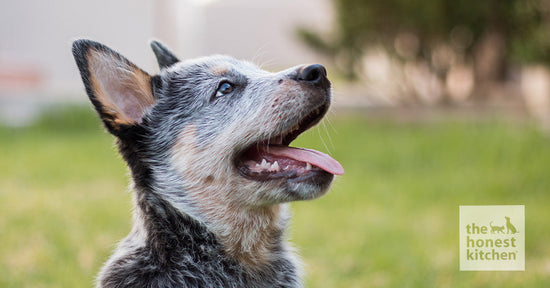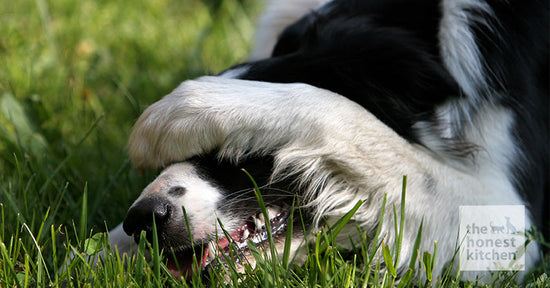Yorkshire Terrier Diet Essentials: Selecting the Best Food for Your Pet

Yorkshire Terrier Diet Essentials: Selecting the Best Food for Your Pet
Yorkshire Terrier’s long, glossy coats can make them seem a little prim and dainty. But, as any Yorkie parent knows, this small breed is actually tenacious, feisty, brave, and even a little bossy at times. Yorkshire Terriers pack a large personality into a very tiny frame — typically no more than seven pounds.
With these unique characteristics also come unique dietary needs that can support a long, happy, and healthy life. In this article, we’ll cover health issues to consider when crafting your Yorkshire Terrier’s diet, as well as specific ingredients to look for to support your pup’s health.
Common Health Concerns in Yorkies and Diet
Periodontal Disease
Due to Yorkshire Terriers’ small mouths, they are more at risk for periodontal disease, which is a serious gum infection that damages the soft tissue around teeth. Symptoms of the disease include discolored teeth, bad breath, inflamed or bleeding gums, and excessive drooling.
To help prevent periodontal disease, choose food and treats that won’t stick to your pup’s teeth, such as dry dog food. Additionally, aim to brush your Yorkie’s teeth regularly and ensure they are drinking enough water to help rinse away food particles.
Patellar Luxation and Disc Disease
Two conditions that impact mobility in Yorkies are patellar luxation and disc disease. Patella luxation happens when a dog’s kneecap dislocates by sliding or popping out of its place when the knee flexes, which causes a lot of pain.
Disc disease, on the other hand, is when the cushion between one or more vertebrae slips or ruptures, causing the disc to press on the spinal cord, resulting in pain and mobility issues.
Since these conditions are more common in Yorkies, it’s important to ensure their diets are rich in nutrients like omega-3 fatty acids and chondroitin to support their joints. If your Yorkie seems to be in pain or is visibly struggling to move as they usually do, make an appointment at your vet to check for these conditions.
Obesity
Obesity is another common health condition in Yorkshire Terriers — and many other toy-sized breeds. In fact, obesity is the most common preventable disease in dogs in North America, where more than half of all dogs are overweight.
Obesity can begin during Yorkie puppies’ early years, so feeding small, frequent meals should be the goal for this young age.
It’s important to talk to your vet to determine how much your Yorkie should be eating at every stage of their life, from puppyhood to their senior dog years. A vet will help you take into account your pup’s activity level, metabolism, and health conditions.
HGE
Yorkies are, unfortunately, notorious for their sensitive stomachs, and they may be more sensitive to certain foods than other dog breeds. One health emergency that can occur from food intolerance is hemorrhagic gastroenteritis (HGE), which is acute bloody diarrhea and/or vomiting.
Though the exact cause of HGE is unknown, diet may play a role. Other causes may include stomach ulcers, trauma, gastrointestinal tumors or obstructions, infectious diseases, and intestinal parasites. If you believe your pup is experiencing HGE, call your emergency vet right away.
If your Yorkie has an especially sensitive stomach and is prone to gastrointestinal issues, check out the best food options for diarrhea. However, diarrhea can quickly escalate to HGE, so be sure to monitor your Yorkie closely if they are experiencing gastro problems and contact your veterinarian for guidance.
Eye Problems
Yorkshire Terriers are genetically prone to eye problems like retinal dysplasia and cataracts. Retinal dysplasia results from abnormal development of the retina, which can reduce a dog’s vision. It’s typically an inherited condition, like cataracts. The difference is that cataracts cause a film over the eye, leading to loss of vision.
Even though you can’t control whether your Yorkie inherits these conditions, there are ways you can support your Yorkie’s ocular health. Focus on a diet rich in antioxidants and look for natural ingredients like berries, carrots, spirulina, and beef liver.
Blood Sugar
Due to Yorkshire Terriers’ size, they are more at risk than larger dogs for either too high or too low of blood sugar — hyperglycemia and hypoglycemia, respectively. Hyperglycemia can, in some cases, lead to diabetes, so it’s an important condition to watch out for.
Though toy breeds, like Yorkies, are more prone to diabetes and hypoglycemia, there are some lifestyle choices that your vet may recommend to help support healthy blood sugar levels. Aim for consistent, stable feeding, ensure regular exercise, and try to limit stress. All of these factors can support a healthy lifestyle among Yorkies.
Cushing’s Disease
Another genetically predisposed health condition common in Yorkshire Terriers is Cushing’s disease. This condition is a malfunction of the adrenal glands, which causes them to produce more steroid hormones than necessary.
Cushing’s disease often develops slowly, so it’s easy to miss early warning signs, which include increased drinking, urinating, and appetite, as well as decreased activity levels.
As the condition progresses, the dog may develop a potbelly and experience thinning of the skin and hair loss. Fortunately, you can treat Cushing’s disease with a precise balance of medications. Talk to your vet if you suspect your pup has any signs of Cushing’s disease.
Portosystemic Shunt
Perhaps a lesser-known health condition that is more common in Yorkies is portosystemic shunt. This condition happens when an abnormal connection forms between the portal vein and another vein.
The portal vein is a large vein that collects blood from the gastrointestinal system, pancreas, and spleen and then carries it to the liver to remove toxins — so it’s a large and extremely important vein.
Most portosystemic shunts are the result of a birth defect, but in some cases, they can form due to serious liver disease. The most common symptoms of a liver shunt are stunted growth, poor muscle development, and abnormal behaviors. If your pup is experiencing any of these, make an appointment with your vet right away.
Collapsing Trachea
The trachea, a windpipe that connects the throat to the lungs, is vital for proper breathing. Unfortunately, Yorkies are more likely than other breeds to experience trachea collapse. This happens when the membrane of the trachea sags or becomes slack, causing difficulty breathing.
Like most of the other health conditions listed above, researchers believe Yorkies are genetically predisposed to tracheal collapse. The primary symptom is a persistent dry, harsh cough that gets worse at night. Connect with your vet if you suspect your Yorkie may have a collapsed trachea.
Ingredients To Look for In Your Yorkie Dog Food
High-Quality Protein
It’s important to choose a dog food with a high-quality protein source as the first ingredient. Even though Yorkies are small dogs, food quality is extremely important for them, due to their higher risk for several serious health issues.
And beyond the actual protein percentage of the food, avoid processed meats and meat by-products — often called meat meal. Meat meals (like chicken meal) are not as nutritionally dense as whole meat proteins. Additionally, meat meals contain fillers that can contribute to stomach upset and poor digestion.
If you’re looking for a nutritionally dense recipe with high-quality protein as the first ingredient, try The Honest Kitchen’s Whole Grain Chicken Clusters for Small Breeds.
Healthy Fats
Look for foods rich in omega-3 and omega-6 fatty acids, which support skin and coat health, joint health, and cognitive function. Sources like fish oil, flaxseed, and chicken fat are good options, and these healthy fats can also support your pup’s immune system.
Your pup also may benefit from Functional Pour-Overs from The Honest Kitchen. These tasty, pourable toppers are full of cage free chicken and bone broth, which are great sources of EPA and DHA to support joint health.
Digestive-Friendly Carbohydrates
While some Yorkies do well with whole grains like brown rice or oatmeal, others may be sensitive to grains. So, if your Yorkie has any digestive issues, look for grain free options like The Honest Kitchen’s Dehydrated Grain Free Chicken recipe (also available in Whole Grain), that contain ingredients like peas, sweet potatoes, and lentils. Avoiding additives and artificial preservatives can be helpful as well.
If you need to transition your dog to grain free food, check out these tips to help make the change go smoothly. And when in doubt, coordinate with a veterinary nutritionist.
Find Out Why People Choose Honest Kitchen for Their Yorkies Today
As a Yorkie parent, trying to identify a pet food to support your pup’s nutritional needs can feel overwhelming. But with food from The Honest Kitchen, you can breathe a sigh of relief.
The Honest Kitchen offers dog parents like you some of the best dog food options — all of which are human grade and nutritionally balanced. With kibble alternatives, whole food options, toppers, and treats, there is something to support the wellness of even the pickiest eater.
Don’t take it just from us — read the real-life experiences of other Yorkshire Terrier parents who switched their furry friend’s food to The Honest Kitchen.



![How To Transition Your Dog’s Food [+ 6 Tips To Help Make The Change]](https://cdn.shopify.com/s/files/1/0612/1858/6874/files/Chalabala_1a709a8c-1b3a-49d9-b547-d9f41613f35c_550x.jpg?v=1709934141)

